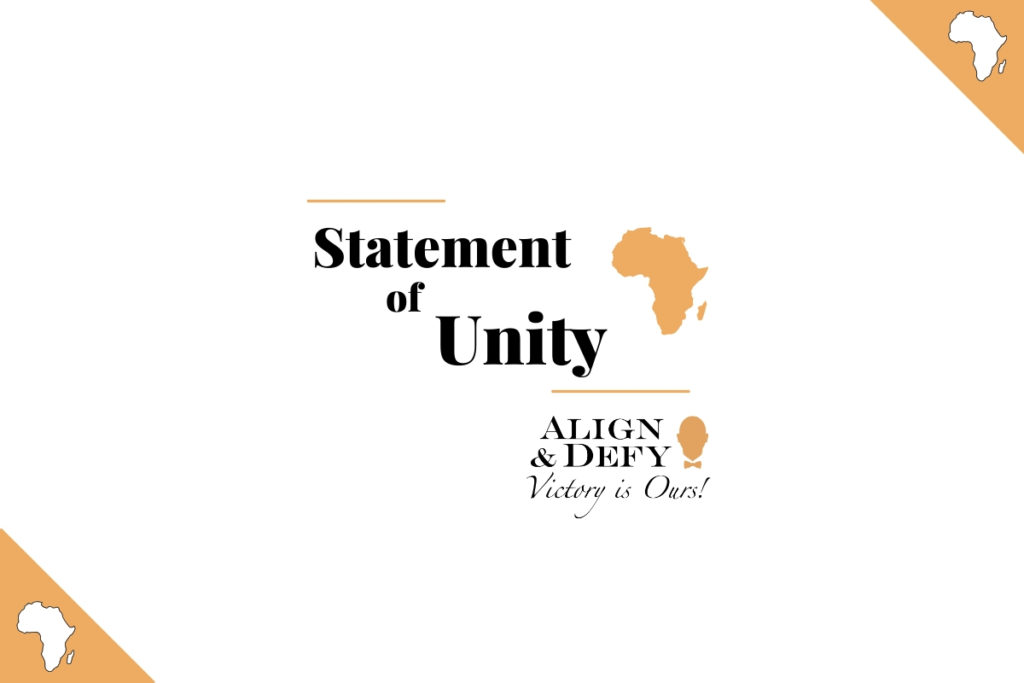
STATEMENT of UNITY
STATEMENT of UNITY
ALIGN & DEFY unites with the theory of African Internationalism, which states that the foundational wealth, of global capitalism is slavery, genocide, war crimes and the perpetual looting of Africa and the rest of the world by the colonizing nations, Europe and America. Thereby establishing a colonial relationship between colonial nations and their colonial subjects, Black (Africans of the diaspora), indigenous and oppressed peoples around the world. It is the latter, colonial subjects that we are in solidarity with, and through this analysis, we contextualize the modern-day lynching of George Floyd and other colonized peoples.
We do not isolate the lynching of George Floyd, Breonna Taylor, Ahmaud Arbery, Eric Garner, Philando Castile, Aiyana Jones, Trayvon Martin, Sean Bell, Amadou Diallo and Emmett Till from the protracted history of colonial violence, war crimes, perpetuated against colonial subjects globally. The knee-on-neck colonial technique has been employed internationally, from the streets of America to the streets of occupied Palestine. Hence, this current moment is not occurring in isolation, it’s connected to a protracted domestic and international struggle against colonialism, the domination and exploitation of a nation, by a foreign nation, which is the hidden hand connecting all oppression in the world. Two of the common expressions of colonialism experienced by colonial subjects, are racism and capitalism, both born out of colonialism. Racism being the ideological rational for colonial domination and exploitation, and capitalism, being the financial exploitation, the looting.
The president of the American Psychological Association stated, “We are living in a racism pandemic, which is taking a heavy psychological toll on our African American citizens. The health consequences are dire. Racism is associated with a host of psychological consequences, including depression, anxiety and other serious, sometimes debilitating conditions, including post-traumatic stress disorder and substance use disorders. Moreover, the stress caused by racism can contribute to the development of cardiovascular and other psychical diseases.” However, as Dr. Iain Ferguson affirms, “it is the economic and political system under which we live—capitalism—which is responsible for the enormously high levels of mental-health problems which we see in the world today.” Furthermore, as Dr. David Matthews states, “Capitalism can never offer the conditions most conducive to achieving mental health. Oppression, exploitation, and inequality greatly repress the true realization of what it means to be human. Opposing the brutality of capitalism’s impact on mental well-being must be central.”
ALIGN & DEFY offers it’s condolences to all that have experienced the mental health consequences of colonialism, the source of racism, capitalism, occupation and war crimes. We encourage those experiencing such consequences to connect with family, friends, faith/support systems, self-care practices, seek professional help, and gain political education and reparations.
In Unity,
“The evils of capitalism are as real as the evils of militarism and the evils of racism.” -Dr. Martin Luther King Jr.
Ramadan, Anxiety and Uncertainty
Ramadan, Anxiety and Uncertainty
By: Nasir Al-Amin, MSW
“I need to know that things will turn out the way I want them to this Ramadan, the uncertainty is unbearable.”
“I must know that my fasting will be accepted, I can’t stand this uncertainty, it’s killing me.”
If you’ve found yourself dwelling on unhelpful thoughts similar to these, to the extent that they are intrusive and interfering with your ability to perform certain daily activities and/or acts of worship then this article [i][ii] may help!
Does worrying about the uncertainty of your fast being accepted give you certainty that it will be accepted? Answer, no! Worry often generates feelings of being overwhelmed, stressed, and discouraged. Those unhelpful feelings can be debilitating as they lead to avoidant, overly cautious or self-sabotaging behaviors in an effort to experience temporary relief. In essence, the more you ruminate, obsess, i.e. profusely worry, about the uncertainty, the more likely you are to generate unhelpful emotions and unhelpful behaviors. A more detailed answer to the initial question: worrying doesn’t change the outcome, it doesn’t produce certainty, rather it’s counterproductive.
Alternatively, a potential solution is the acceptance of uncertainty, which is accepting the uncertainty inherent any situation, thus letting go of the absolute need for certainty and absolute control of the outcome. To help you towards accepting uncertainty, I suggest you ask yourself the following questions:
(1) Am I performing this action/act of worship (fasting) in accordance with all of the information I have?
(2) Is it possible to have 100% certainty that this action/act of worship (fasting) will be accepted?
(3) Does constantly thinking about the uncertainty involved help me preform this action or does it make me feel more anxious (overwhelmed, discouraged) in the process?
(4) Is it worth it to me to perform this action, despite the fact that I can’t know for sure if it will be accepted?
(5) Given what I have learned, how can I adjust my perspective, narrative, on uncertainty?
(6) In an effort to control the narrative, what self-helping statements can I tell myself when I notice I’m dwelling on uncertainty?
For instance, look at the following examples of Unhelpful Thinking (Self-Statements) and their Helpful Thinking (Self Statements) alternatives:
Unhelpful Statement:
“I must know that my fast will be accepted, I can’t handle this uncertainty.”
Alternative Helpful Statements:
“Although I prefer to have certainty about the acceptance of my fast, there is no reason why I must have it in order to perform the fast, and I can tolerate not knowing if my fast will be accepted.”
or
“I would really prefer to have certainty regarding the acceptance of my fast, however I can handle the uncertainty. And, it’s worth it to me to tolerate the uncertainty in order to perform the fast with less emotional discomfort.”
Unhelpful Statement:
I must know that things will turn out the way I want them to, the uncertainty is unbearable.”
Alternative Helpful Statements:
“Although I prefer to have certainty about the outcome, there is no rule that says I must have it, and I can tolerate not knowing how things will turn out.”
Takeaway:
When you control the narrative, the lens through which you perceive and evaluate the world, you position yourself to control and/or greatly influence how you feel about it. Essentially, as you adjust or change the lens, you adjust and change how you feel. Our perspective, narrative, can greatly influence how we feel about events, choices and actions, and can help us cope with uncertainty and respond with self-helping thoughts, feelings and actions. The key is accepting uncertainty, by earnestly striving to relinquish the demand for certainty, and learn to tolerate uncertainty, as well as tolerate it’s associated discomfort.
Action steps:
Give the following action steps a try: (1) Journal about your answers to the abovementioned set of questions; (2) When you start to experience the unhelpful emotions associated with uncertainty, assess and adjust the narrative you are telling yourself; (3) Utilize self-helping statements and quotations that reinforce the importance of controlling the narrative; (4) Post visual reminders of your self-helping statements and quotations around your home, office and car to serve as gentle reminders; (5) If you are not working with a mental health practitioner, consider connect with one; (6) Connect with me, let me know if the questions and actions steps resonated with you and if so how?
Lastly, the following are a few quotes I utilize when I need a helpful reminder to Control the Narrative:
“Change your mind, your consciousness, and you’ll change your circumstances.”-Amos Wilson
“Once you change your philosophy, you change your thought pattern. Once you change your thought pattern, you change your — your attitude. Once you change your attitude, it changes your behavior pattern and then you go on into some action.” –Malcolm X
Nasir Al-Amin MSW, a mental health practitioner and founder of ALIGN & DEFY, an online platform for virtual consultancy and coaching services that helps people understand and control their emotions, in order to live in alignment with their goals, values and purpose.
Online appointments can be scheduled at the following link: Work with Me!
[i] This article intentionally excluded any Islamic references as it is the author’s contention that the issue in question is the lens through which references are assessed and evaluated, not so much the Islamic references themselves.
[ii] This article will be a part of a forthcoming online course entitled, “How to Controlling Your Emotions.”

